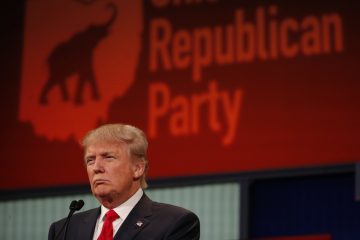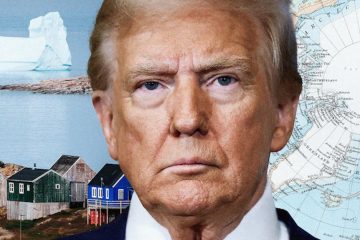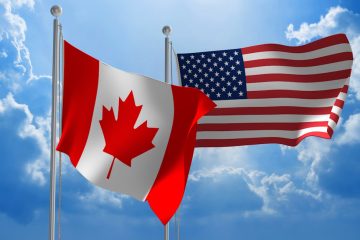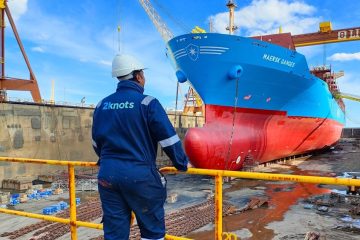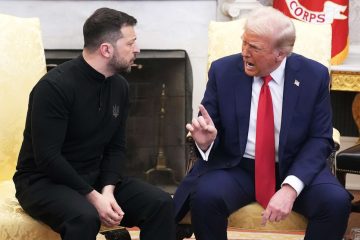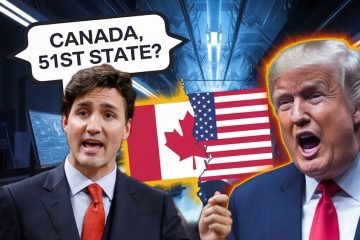Did Ukraine Miss an Early Chance to Negotiate Peace With Russia?
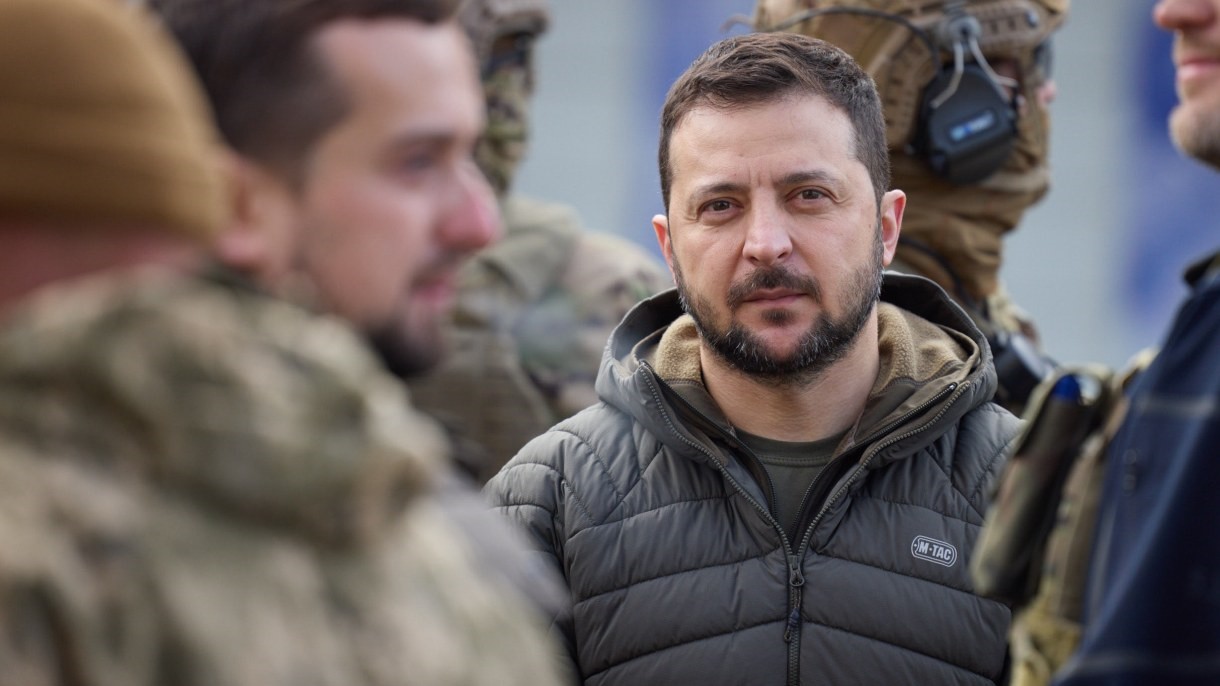
The lead Ukrainian negotiator, David Arakhamia, pointed to a bottle of sanitizing gel on the table, covered by a crisp white cloth, as Russian and Ukrainian peace delegations gathered in Istanbul’s Dolmabahçe Palace.
“That’s an antiseptic,” Arakhamia told his Russian counterpart, President Vladimir Putin’s adviser Vladimir Medinsky.
“Ah, I thought it’s vodka,” Medinsky joked.
There was plenty of tension behind the jovial appearances during that pivotal meeting on March 29, 2022. Dmytro Kuleba, the Ukrainian foreign minister, had just publicly advised Ukrainian negotiators not to accept any beverages from the Russians and not to touch any surfaces, lest they be poisoned. After all, Russian forces were still at the gates of Kyiv, trying to overthrow President Volodymyr Zelensky and his government.
What actually happened on that momentous Tuesday and in the immediate aftermath has since turned into a matter of fundamental disagreement among Ukraine, Western nations and Russia. The Istanbul meeting has also emerged as a key point of discord in America’s own debate about the war, as indispensable U.S. aid to Ukraine remains stalled in Congress because of Republican opposition. Some argue that Ukraine blew a chance at the time to end the war. The real story paints a different, and far more complicated, picture.
The first meeting between Ukrainian and Russian negotiators happened on Feb. 28, 2022, in the Belarusian city of Gomel, four days after Russian tanks crossed the Ukrainian border. At that encounter, Medinsky recited a long list of the Kremlin’s demands. It included the replacement of Zelensky’s administration with a puppet regime, Ukrainian troops handing over all their tanks and artillery, the arrest and trial of “Nazis”—a Russian euphemism for any Ukrainian opposed to Moscow’s rule—and the restoration of Russian as Ukraine’s official language. Medinsky even demanded that city streets named after Ukrainian national heroes be returned to their old Soviet names.
“We listened to them, and we realized that these are not people sent for talks but for our capitulation,” recalled one of the Ukrainian negotiators, Zelensky’s adviser Mykhailo Podolyak. Yet to gain time the Ukrainians agreed to keep talking.
On March 10, Kuleba flew to the Turkish resort town of Antalya to meet his Russian counterpart, Sergei Lavrov, in their first encounter since the war began. “I asked Lavrov a simple question behind closed doors in Antalya: Minister, what do you want? That is all I wanted to know,” Kuleba recalled. Lavrov didn’t reply, launching instead into the usual Russian litany of allegations that Ukraine had turned into a neo-Nazi den hellbent on undermining Russia.
In the 19 days between the meeting in Antalya and the Istanbul talks, the battlefield situation shifted dramatically in Ukraine’s favor. All around Kyiv, nimble Ukrainian forces inflicted defeat after defeat on over-extended Russian units.
Throughout the talks, the issue of Ukrainian membership in NATO was a critical part of the agenda. In the first weeks of the war, Zelensky indicated that Ukraine could forgo its dream of joining NATO in exchange for binding security guarantees from the West and Russia alike. Ukrainian negotiators also showed flexibility on Russian demands to reduce the size of Ukraine’s military and freeze the issue of who controls Crimea, a peninsula occupied by Moscow since 2014, for the foreseeable future. None of this, of course, was enough to stop the Russian onslaught on the ground and the Russian bombs and missiles that kept raining down on Ukrainian cities.
As Turkish President Recep Tayyip Erdogan opened the Istanbul talks on March 29, the mandate of the Ukrainian team was to push for a Russian withdrawal to pre-invasion lines while showing openness on many key issues, with actual decisions deferred to a planned meeting between Zelensky and Putin.
Russia’s major demand, in addition to keeping Ukraine out of NATO, was to limit its ability to defend itself in the future. According to draft documents later revealed publicly by Putin, Moscow wanted Ukraine’s armed forces capped at 85,000 troops, 342 tanks and 519 artillery pieces. Ukrainian negotiators in Istanbul countered with a proposal for an army of 250,000 troops, roughly its prewar level, with 800 tanks and 1,900 artillery pieces.
Just as the conference started, Russia’s defense minister, Sergei Shoigu, made a striking announcement from Moscow. The main goals of Russia’s “special military operation” had been generally fulfilled, he said. Hours later, Medinsky appeared at a press conference in Istanbul with even more astonishing news. The talks held that day had achieved significant progress, he announced, and Moscow had decided to take steps to de-escalate the conflict. Battered Russian troops started to withdraw from the Kyiv region and other parts of northern Ukraine.
According to Putin’s version of events, Ukrainian negotiators in Istanbul had accepted most of Russia’s demands. “The agreements were practically reached,” he lamented months later. “Our troops left the center of Ukraine, Kyiv, to create conditions” for further talks to finalize that accord, he said.
Ukraine has vehemently disputed that account. Neither side made binding commitments in Istanbul, according to Kuleba. “There was no deal,” he said. “To engage in a conversation and to commit yourself to something are completely different things.” As for the Russian pullback, Ukrainian and American officials say Putin had no choice but to withdraw by late March because of Ukrainian military successes on the ground.
Col. Igor Girkin, a retired Russian intelligence officer and the former defense minister of a Russian proxy statelet in Donbas, agreed. “If leaving the seized territory has become inevitable, it’s best to do it before your troops are routed by the adversary,” he said shortly after the Istanbul announcements. “We will still need these troops—the war will be long.” Girkin has since been imprisoned in Moscow for criticizing Russian military failures,
On the evening of March 29, as the negotiators saluted each other in Istanbul and made plans to reconvene for the next round of talks, Ukrainian troops were already entering the town of Bucha near Kyiv. What the Ukrainians discovered there rendered moot any understanding reached in Istanbul.
Like other northwestern suburbs in Kyiv’s green belt across the Irpin River, Bucha was a relaxed town of single-family homes and five-story housing blocks set amid pine trees, playgrounds, and parks. It had a handful of resorts, with swimming pools for the guests, and an equestrian club. As Ukrainian forces advanced into Bucha, they stumbled upon a horrifying sight: Dozens of bodies lay rotting under the rain on Yablunska Street and in surrounding areas. Some corpses were missing limbs, likely eaten by dogs, while others had brains spilling from cracked skulls.
As the soldiers probed further, they found several men, many of them stripped naked to their waists, executed and lying on the ground in the courtyard of 144 Yablunska Street. On sidewalks, in ditches and in improvised graves, there were other bodies with their hands tied. Some bore the signs of torture: poked-out eyes, cut-off fingers.
More than 450 civilians were killed in Bucha during the month the town was under Russian occupation. Atrocities had been occurring throughout occupied Ukraine, especially in Mariupol. But in Bucha, the Russian soldiers fled so fast that they hadn’t had the time to remove the evidence and conceal the scale of the slaughter.
As the footage from Bucha spread on social media, Zelensky—like most Ukrainians—was overwhelmed with fury. “The essence of evil has come to our land—murderers, torturers, rapists and looters who call themselves an army,” he said in an address to Ukrainians. “They have killed consciously, and with pleasure.”
Even though the Ukrainian and Russian negotiators remained in touch, fine-tuning the documents drafted in Istanbul the previous week, Zelensky signaled that the killings uncovered in Bucha had changed everything. “What has happened here is genocide,” he said, stern-faced, during his visit to the town—the first time he had left Kyiv since the invasion. “It is very hard to keep talking when you see what has happened here.”
There was no contrition in Moscow after the horrors of Bucha came to light. “It’s a clear provocation,” thundered Lavrov. Not a single Ukrainian civilian had been harmed, declared Russia’s ministry of defense. Medinsky said the Ukrainians must have staged the atrocities in Bucha because its name rhymed with the English word “butcher.”
On April 9, British Prime Minister Boris Johnson arrived in a Kyiv transformed. He was one of the first Western leaders to brave the trip since the invasion. Less than two weeks had elapsed since the Istanbul talks and, despite Zelensky’s outrage, the Russian and Ukrainian negotiating teams still pursued contacts via Zoom.
“I was a bit worried at that stage,” Johnson recalled. “I could not see for the life of me what the deal could be, and I thought that any deal with Putin was going to be pretty sordid.” Sitting down with Zelensky in Kyiv, the British prime minister delivered his pitch: “Nobody can be more Ukrainian than Ukrainians, it is not for me to tell you what your war objectives can be, but as far as I am concerned, Putin must fail and Ukraine must be entitled to retain full sovereignty and independence. …. We’re not directly fighting, you are. It’s the Ukrainians who are fighting and dying. But we would back Ukraine a thousand percent.”
Zelensky didn’t need much convincing. The conversation quickly shifted to the concrete ways in which the United Kingdom could assist the Ukrainian armed forces, such as the provision of military supplies. It was the first trickle in what would become a flood of increasingly sophisticated Western weapons. Meanwhile, online talks between Ukrainian and Russian teams fizzled away.
In the Kremlin, Putin was certain that Washington, rather than London, had forced Zelensky to abandon talks in the hope of exhausting Russia in a protracted war. Senior Russian officials kept angrily raising this point in meetings with their American counterparts. “Utter bulls—t,” a senior Biden administration official told me. “I know for a fact the United States didn’t pull the plug on that. We were watching it carefully.”
Zelensky’s new position, which hasn’t changed since, was to demand a full withdrawal of Russian troops from all Ukrainian lands conquered since 2014, including Crimea, and the prosecution of Russian officials suspected of war crimes.
“In Istanbul, we still didn’t understand the type of war that Russia was waging, its genocidal intent,” Podolyak explained. “Once we returned from Istanbul, and the Russians left the Kyiv region, we saw the beastly crimes that they had committed there. And we understood that Russia will try to annihilate Ukraine no matter what.”

